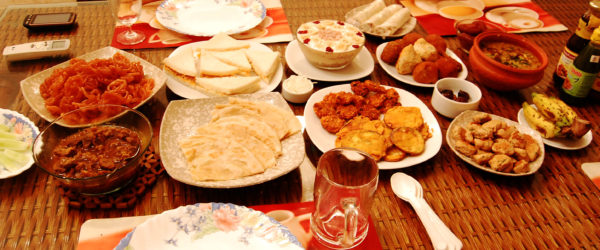Last summer, I did not return home at the end of the school year. Having spent the previous Ramadan fasting alone and in secret, I decided that going elsewhere for the following summer would allow me to be freer in my religious expression during the Holy Month. To this day I’m incredibly grateful for having the privilege of being able to travel to a friend’s house and spend the first half of the Month with their family. As the second half of the month rolled around, it was time for me to move back to China and start my preparations for school. Because I don’t have a Muslim family to spend Eid with, I called together a group of friends for an Eid dinner. After the dinner, I decided I would no longer be hosting any more dinner parties, at least not for a long time.
My parents are not the type of people to host dinner parties, but hailing from the southeastern region of the United States, my family is no stranger to food-centric gatherings. In my particular community, there is a tacit expectation that dinner guests will participate in some capacity in the running of the function. Some guests choose to bring side dishes, others help prepare the main courses, still more offer to clean the dishes. Every guest wordlessly completes a task to thank the host for the invitation. Having the work split among many people helps the entire event run more smoothly, and strengthens the bonds between friends and family.
While I certainly enjoyed the company of my friends during my Eid dinner, the stress of pulling the dinner together overwhelmed me. The dinner was not the first event I’d overseen: in my university, I spent two years leading clubs that frequently held cultural events and get togethers. The difference was that those events were often planned and executed by communities, and usually, my friends would step in and help, even if they otherwise had nothing to do with the event. This did not extend to my dinner party. Of the twelve or so people I invited, only three offered to help, and one of those people kept disappearing.
I quickly found myself running around in circles. The pineapple needed to be gutted, the vinegar bottle tipped over into my egg dish, and the chicken needed constant stirring. Besides that, I miscalculated the amount of ingredients (I’ve never been very good at math) and wound up making far less food than I’d originally planned. It would have been nice to be able to have a couple extra hands in the kitchen so I could run to the grocery store and pick up more food. I was exhausted after preparing such a large meal (I wound up making five or six different dishes). Having to wash the pots and pans afterward (I was using my university’s communal kitchen) was an almost unbearable task. Thankfully, the people who assisted me in preparing the meal also helped me clean up.
I realize that I sound like I’m complaining, and I want to make it clear that I do not blame my guests for their actions. Looking back at the people I invited, I see now that cultural difference played a huge part in my frustration. Two of the people that helped were Americans from roughly the same areas of the U.S. as me, and the third person (the one that kept disappearing) was one of my best friends. Knowing who I am and where I come from, they stepped in to chop vegetables and clean pans so I could tend to the food on the stove. The others were from areas of the world where household helpers are common, and it never occurred to them that cooking for a large group of people might be difficult. They’d never cooked for themselves, and their mothers tended to supervise the cooking more so than engage in it directly. My friends may not have realized they could step in and save me.

[Image source].
I should not have overestimated my ability to pull the event off, and I should been more explicit in asking my friends for help. Part of my hesitation had to do with pride. I somewhat take pride in my cooking, and asking for help is always a little awkward. On the one hand, I suppose I should be proud most of my friends did not offer to help. It could mean that they were confident enough in my abilities as a cook to assume I could prepare everything by myself. In some places, offering the host help is actually considered rude, because it may imply that the host is incapable of handling the dinner party on his or her own. Offering help in such a context would likely offend the host and strain the relationship between the host and the guest. In other words, just as I was doing my best to be a good host, maybe my guests were doing their best to be good guests, and the stress came from different expectations rather than any thoughtlessness or bad intentions.
Still, part of me was disappointed that so few of my friends came to save me from drowning. For those of you who attend iftar and Eid gatherings, pay attention to your host(s). Are they more taciturn than usual? Are they running around from place to place without actually getting anything done? Are they more short-tempered than usual? Perhaps they need a little assistance but are too afraid to ask.
Being wary of your surroundings is especially important when the host comes from a different culture from your own. As we all try our best to navigate different expectations, your offer may be appreciated.

